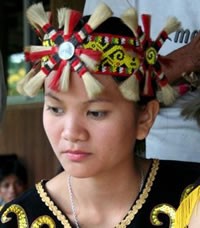According to Punan (Punan Bah) traditions Bua came from the Sekapan area where he was married to Lapan, or Jali as the Punan Bah call her. Bua was an etun oa, that is a supernatural being and gifted with special powers. Once upon a time he arrived in the Bah area, and here he created the Bah River and the Punan Bah people.
Bua then left the area for some time, only to find upon his return that people were quarreling and fighting. Consequently, he gave up his initial intention of creating more Punan Bah people. He fled the country never to return, but in his haste he left his quiver behind. The quiver has turned into a stone and is still to be seen up the Bah River. Another stone bears the imprint of his posteriors, proving to the Punan Bah that Bua was once resting here.
Bua had two children, Tadou and Taga, through whom the Punan Bah trace their descent. They and their close descendants were all etun oa, but in successive generations the supernatural powers faded away. Balauan and Yuan Mikuang, for example, had already lost much of their supernatural capacities, and later generations had no such powers.
Though apparently this descent line tells the story of the aristocrats only, it is in Punan Bah opinion the story of their society in general. The Punan Bah believe that they all are descendants of Bua. Those who achieved chieftainship and a few others are the only ones to be remembered today, but they all stem from the same root. Ordinary Punan Bah, or panyin, are descendants of Bua, and so are the slaves, lipien.
According to the myth the Punan Bah were thus created at the lower Bah River. But Bua's great-grandson, Aviang Yabu, moved up the river with all his followers and settled at the Sematai-Bah Junction. There are no precise memories about the number of settlements in this early phase of Punan Bah history.
The rural, longhouse dwelling Punan is still largely a swidden agriculturalist communities. Most still practice swidden farming with rice as their main crop supplemented with other non-cash crops. They also plant cash crop such as rubber and pepper to supplement their income. However the new, younger generations who enjoyed better education mostly found their ways into the public and private sector employment. It is estimated to be almost 20 percent of Punan population today have migrated to urban areas such as Bintulu, Kapit, Sibu, Kuching and as far as Kuala Lumpur.
Many Punan especially those found along the Rejang river still hold on to their traditional religion called Bungan and other forms of ancient worship. Those found in Bintulu Division such such as Punan Pedan, Punan Jelalong and Punan Kakus are mostly Christians belonging either to Roman Catholics or Borneo Evangelical Church (SIB) denominations. A small number, not more than 100, of Punan have also embraced Islam as a result of inter-marriages with Muslim peoples.
The Punan still very much in need of help adapting to the new cash economy which have grown rapidly with opening up of rural land for large scale commercial farming. They are also still lag behind other communities in term of education. As in 2007 there were only more 30 Punan have completed tertiary education. Drop-outs among rural children still very high as many as one out of 20 Punan school going children forced to drop out because of poverty.
Pray for the Punan Bah-Biaus to have the educational opportunities they need.
Pray for the Lord to bless them materially and spiritually.
Pray for the Holy Spirit to move powerfully in their families and churches, drawing them closer to the Lord of lords.
Scripture Prayers for the Punan Bah-Biau in Malaysia.
Punan Bah Network
| Profile Source: Joshua Project |










